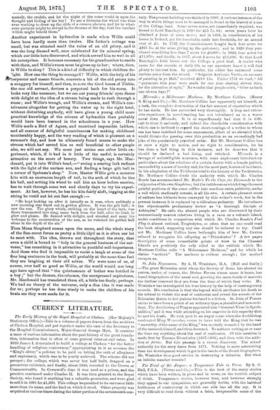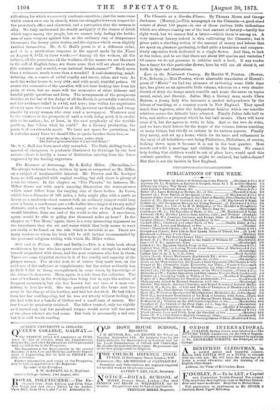The Trial of Sir Jasper: a Temperance Tale in Verse.
By S. C. Hall, F.S.A. (Virtue and Co.)—This is the best of the many stories which have been written, in prose and in verse, on the terrible subject of drink. Temperance stories, however true, and however strongly they appeal to our sympathies, are generally feeble, with the habitual feebleness of controversy in which one side has all the say. It is very difficult to read them without a faint, irrepressible sense of the
ridiculous, for which we severely condemn ourselves ; just the same sense which comes over one in church, when one struggles between respect for the preacher's office and character, and a perception that the sermon is silly. We fully understand the deadly malignity of the demon of drink which rages among the people, but we cannot help feeling the feeble- ness of such weapons against him as the ordinary run of temperance literature ; the dreary prize stories, and the rhymes which seem slightly fuddled themselves. Mr. S. C. Hall's poem is of a different order, and it is a meritorious response to the appeal made by the Times on August 9, 1872, in these words :—" Among all the writers, all the talkers, all the preachers, all the workers, all the names we see blazoned in the roll of English fame, are there none that will set about to abate this nuisance and scandal,—our national drunkenness ?" Much more than a nuisance, much worse than a scandal! A soul-destroying, mind- debasing sin, a source of awful cruelty and terror, crime and ruin. As such the writer treats it, very ably, and with much truthful pathos. Of course the economics of the question will not bear looking into from his point of view, but no more will the economics of other hideous and hateful public questions and facts. The arraignment of the prosperous distiller at the bar of the Judge of all the Earth is powerfully conceived, and the evidence called is awful, and true ; true within the experience of every man who ever looked on at life, however carelessly, and recog- nisable by every woman who ever read a newspaper. Whatever may be the chances or the prospects of such a work doing good, it is credit- able to its author; he, at least, in the vast perplexity of the terrible problem, has "done what he could." As a literary production, the poem is of considerable merit. We have not space for quotations, but it contains many lines we should like to quote besides these two:—
" Ask what the judges, doctors, jailers think
The Nation gets—and what it pays—for drink?"
Mr. S. C. Hall has been most ably seconded. The little shilling book, a marvel of cheapness, is profusely illustrated by drawings by our best artists—there is hardly a name of distinction missing from the list— engraved by the leading engravers.































 Previous page
Previous page